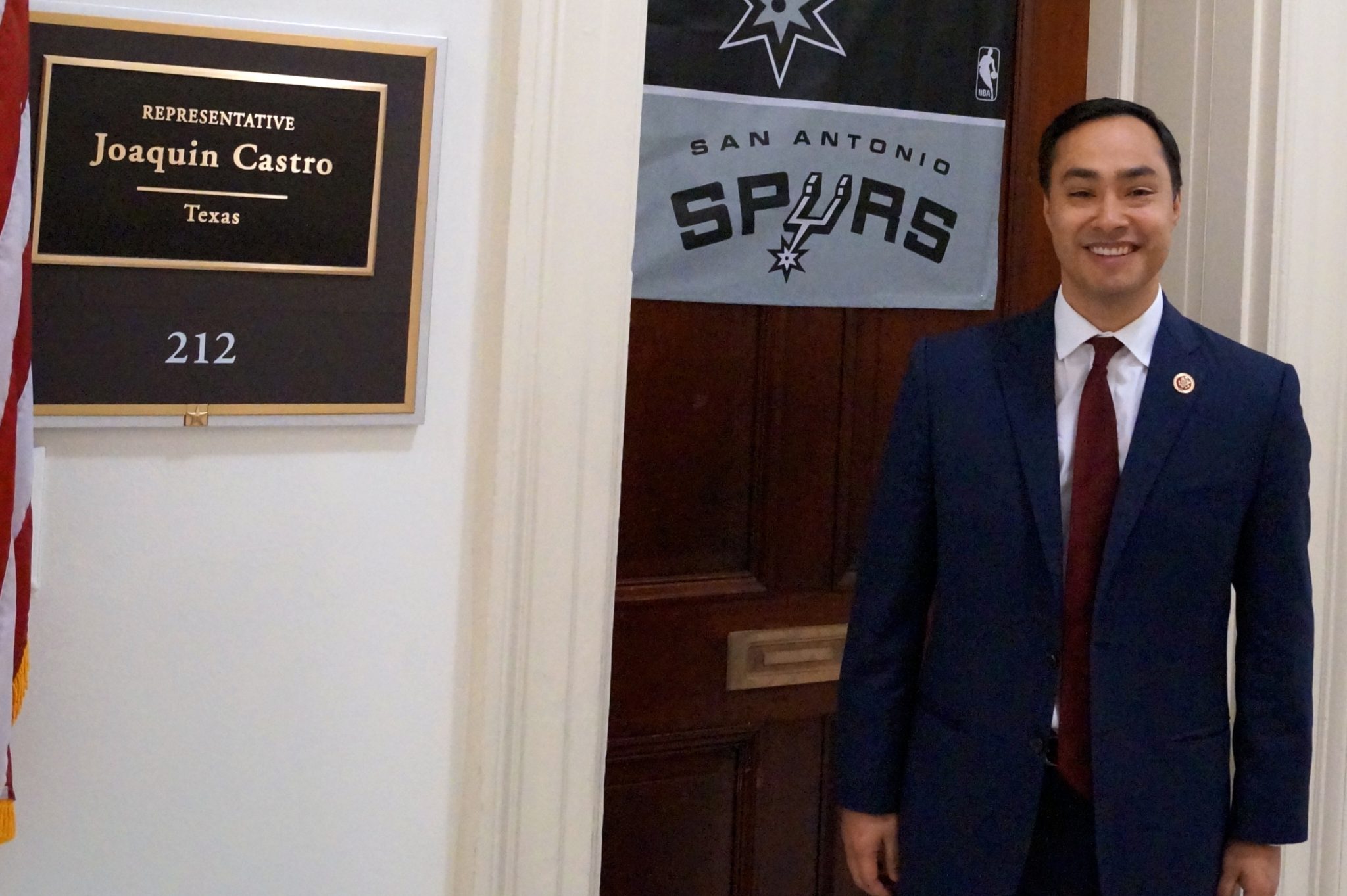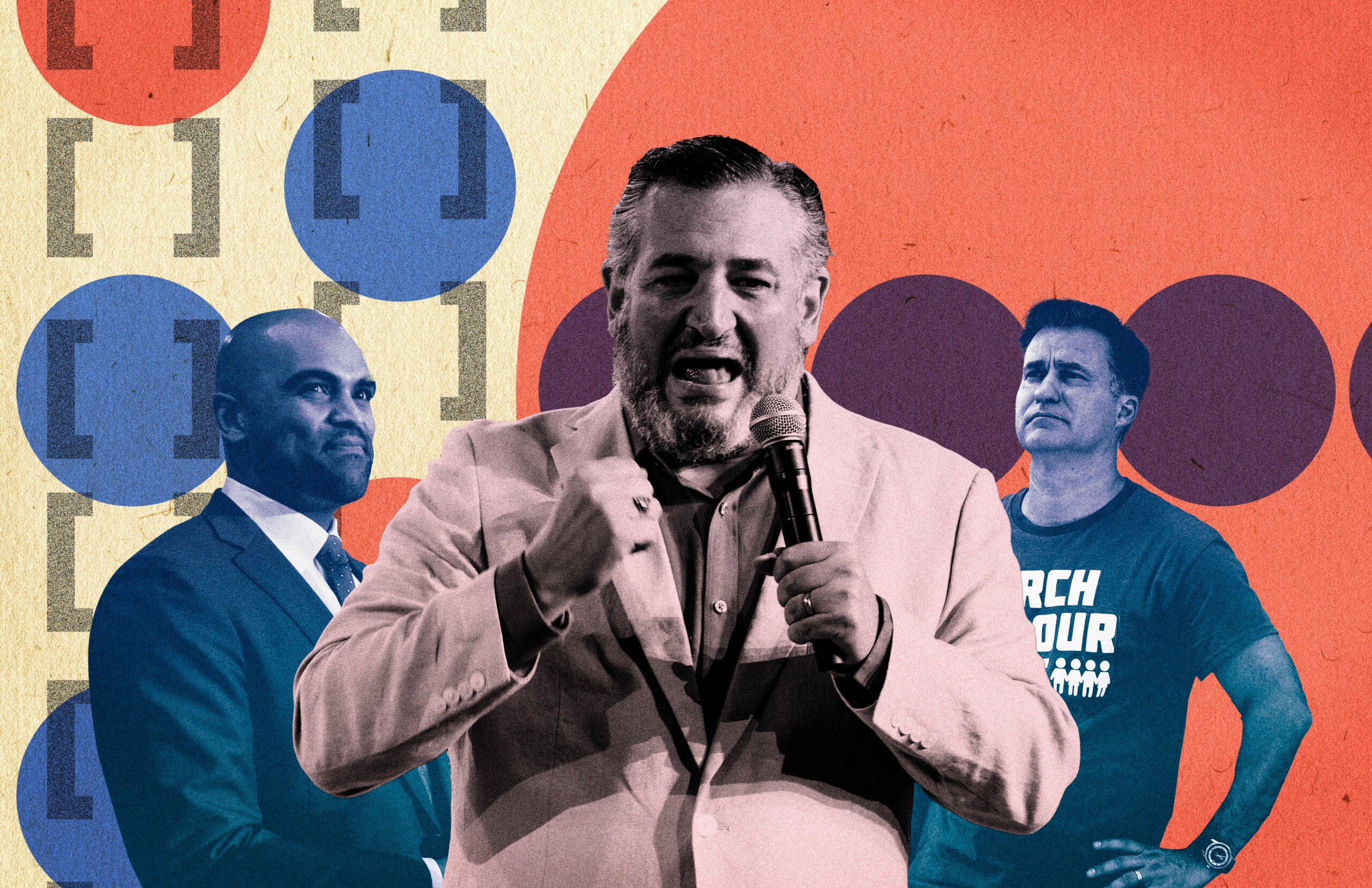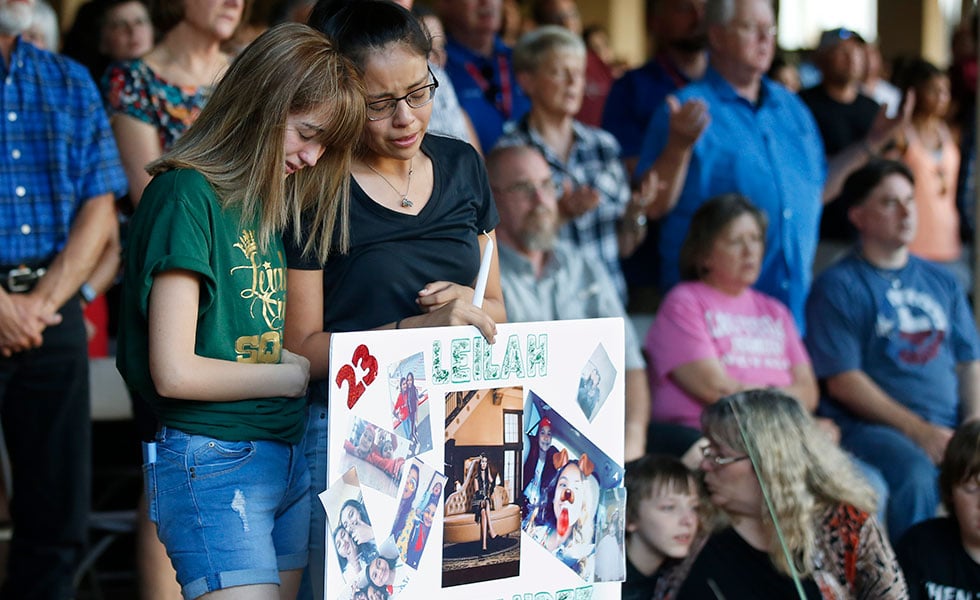
Q&A with U.S. Rep. Joaquín Castro
Rep. Joaquin Castro talks to us in Washington this week about congressional dysfunction, immigration reform, Dan Patrick and his political future.

Above: U.S. Rep. Joaquín Castro outside of his House office. May 1, 2013.
Joaquín Castro served in the Texas Legislature for 10 years. It wasn’t an easy time—he joined the Texas House at a low point for Texas Democrats, watched them rebuild slowly over the next six years and left just after another historic drubbing. But it was still a place with a relatively intimate, collegial feel. The office of your worst enemy was never more than a few steps away. Then, in 2012, he was elected to Congress.
On Wednesday, I met Rep. Castro in Washington, D.C., at Tortilla Coast, a Tex-Mex restaurant a block away from his perch in the Cannon House Office Building. Tortilla Coast has become a traditional meeting place on the Hill, but it’s most famous for its role in what become known, tongue-in-cheek, as the Tortilla Coast Rebellion. Sen. Ted Cruz held strategy sessions with House Republicans in the basement of the building during last year’s government shutdown, at a time when both were trying to find a way to buck the Republican leadership under House Speaker John Boehner, who was trying to find a face-saving way to end the shutdown.
Cruz—and Tortilla Coast with it—became a byword for Congress’ do-nothingism, and the gleeful obstructionism that seems to pervade all of our national debates recently. Castro’s name inevitably comes up when Democrats talk about finding someone to challenge Cruz in 2018.
The House was in session this week—unlike the two previous weeks—but even still, the body was winding down as it headed toward a long weekend before another abbreviated work week next week… and then another week-long recess. That fact stood in sharp contrast to the day’s protesters, who, despite drenching rain, stood in front of the Capitol to urge legislative action on immigration reform. More than 20 were arrested, including an 11-year-old boy.
At Tortilla Coast, Castro was solemn. Over the next half-hour, we talked about congressional dysfunction, the prospects for immigration reform, Paul Ryan’s budget, his political future and Dan Patrick’s relationship with the Republican Party. Remarks have been lightly edited.
Texas Observer: Did the Texas Legislature teach you anything about being effective in the minority?
Joaquín Castro: Being in the minority forced you to learn to be effective without the benefit of numbers on your side. It’s certainly been helpful with the situation now.
One of the most fundamental things you have to develop is your relationships. Your friendships with people, your ability to be fair and honest and your ability to earn people’s respect. To the extent that I was able to accomplish things in Texas, I think a lot of it was based on that.
TO: Is that possible to do that here in Congress? Are there any Republicans in the Texas congressional delegation you’re particularly close with?
JC: I’m on good terms with several of them—quite frankly, I haven’t spent a lot of time with several of them, also. The challenge in Washington is that it’s such a come-and-go culture for the Congress. You know, we spend more time on airplanes then we do on the House floor. The culture is very different here, the process is very different here than in Texas. In Texas, for example, we had assigned seating, so you were next to the same person all the time. You weren’t divided up by party. Here, there’s no assigned seating. People are nomadic.
Even the way they do debate here is very different. Everything is debated at once—all the bills and amendments for the day. People come in to vote, spend 20 or 25 minutes on the floor, and then they leave. It’s a different environment that makes it more difficult to spend time with people and develop relationships.
TO: If you could change that, do you really think we’d see a change in the way Congress works?
JC: I think you could make changes that would be conducive to bipartisanship and to productivity, yeah. I’ll give you a perfect example. Look at what happened in 2009 in the Texas Legislature. In 2009, there were 76 Republicans and 74 Democrats [in the House] and about 60-something Democrats teamed up with 11 Republicans and elected a moderate Republican speaker. Here, you vote by party—Republicans vote for Boehner, and we, of course, vote for Nancy Pelosi.
It’s crossed my mind that we could essentially do what we did in Texas that time. If you were able to get a group of moderate Republicans to vote with Democrats, you could elect a new speaker of the House. The challenge is, of course, the traditions and customs of this place are so partisan that, at the moment at least, that seems beyond the vision of many folks.
TO: There’s been some talk lately about a push to revive comprehensive immigration reform this summer. A Republican member of the Texas congressional delegation, Joe Barton, announced his intention to bring his bill to the floor. What do you think the chances are Congress is serious this time?
JC: I’m very hopeful. You know I spent a while going on all these Sunday news shows saying I thought it was going to happen in 2013. So, maybe my opinion is not a good one, but…
First of all, I want to thank Joe Barton for stepping forward and being the first of all the Texas Republicans to step forward and clearly state that he supports comprehensive immigration reform, and come forward with a plan. Nobody in Texas had done that. The senators certainly aren’t going to do it, and House Republicans had not come forward. So I think it’s a positive step.
In terms of the prospects for it—what makes it tough at this point, apart from the lack of will on the Republican side, is the way that Boehner has set up the calendar. We’re only in session 26 days after July 31. So that makes it difficult to do anything big—immigration reform, tax reform, any of those bills. But of course, we’re going to keep pushing.
TO: Does Barton’s recent talk represent a opening?
JC: If he presents something, and files something, then yes, it does. Let me say clearly, I’m not saying I agree with the plan that he’s come up with. But the fact that he’s put a foot forward is hopeful, because it’s more than anything else that’s happened.
TO: And if it doesn’t gain momentum by July 31st, it gets pushed to 2015?
JC: The prospects for this year go down dramatically after that point. I think 2016 is the backstop, because Republicans have been chasing the Hispanic vote so intently. But also, by waiting, they’ll have to deal with presidential politics—10 candidates standing up there at a Fox News debate talking about alligator moats and electrified fences.
TO: Your brother, Mayor Julian Castro, participated in a discussion about immigration reform at the recent Civil Rights Summit held by the LBJ Presidential Library. A UT student named Deborah Alemu disrupted the event, calling for Castro to tell President Obama to alter his deportation policies.
Afterwards, she said she blamed Republicans for deadlock on immigration reform—but said she was frustrated that Democrats weren’t more vocal on the issue, when deportations were taking a daily toll on the people around her. What do you say to people who feel the way she does?
JC: Well first of all, it’s good that they’re getting involved and speaking out. Many of the political movements over the years—almost all of them—have started with regular people who have been affected by something, not politicians. So it’s good to see their energy and their passion.
Some of what you see with the Dreamers is an incredible desperation and frustration, and they’re going to focus that frustration on anybody in politics. And that’s understandable. But it also doesn’t mean that [Democrats] haven’t spoken up. Many of us have been pushing very hard. I stood three feet from the president and asked him to review his deportation policies months ago.
TO: What do you think the president should do in regards to deportations?
JC: The homeland security director right now is reviewing it. He has said that he’s going to make short-term changes, and then try to make long-term changes. But the first thing is that Congress needs to pass legislation. Executive action is a stopgap measure. It’s kind of a bridge that the president can provide, and then if you don’t follow it up with legislation, you’ve left people on that bridge, basically. I’m anxious to see what the director of homeland security, Jeh Johnson, comes up with. I would suspect that they’re either going to expand [the Deferred Action for Childhood Arrivals program] or otherwise curb deportations.
TO: Wisconsin Rep. Paul Ryan has recently been holding hearings about what he’s terming a GOP anti-poverty plan. At the same time, his budget plan, which recently passed the House, makes sweeping cuts to social programs. What do you make of the Ryan budget, and his influence in the House GOP caucus?
JC: The idea that it’s an anti-poverty budget is disingenuous. What makes America special among the nations of the world is that we’ve built up this infrastructure of opportunity, and that includes certain things—public schools and universities, a strong health care system, and an economy that’s built around well-paying jobs. The main difference I see between Republicans and Democrats today is that Republicans would either abandon or dismantle that infrastructure of opportunity, and Democrats are trying to build it up.
So, for example, with the Ryan budget, he cuts $145 billion from Pell grants, cuts work study and student loans, and makes students start accruing interest on their debts while they’re still in school. That’s making it tougher to get a college degree. When he disqualifies part-time students from Pell grants, that’s making it tougher for a working mom or dad to go back and finish off a degree. So you’re starting to really undermine the ways people can pull themselves up in America.
But it’s not just that, they’re cutting things like Small Business Administration loans—billions and billions of dollars administered through the SBA lending programs. You’re cutting off the ability of people who want to be small business owners and entrepreneurs to do that. In most areas that budget is pretty harmful not just to the economy but to the ability of America to maintain itself as the pre-eminent nation of opportunity in the world.
TO: Switching to Texas politics: How did you think your brother did in the recent debate against Dan Patrick? What do you make of the 2014 election cycle so far?
JC: I thought he did very well. I think he did well highlighting Dan Patrick’s extreme move to the right among Texas Republicans. I thought he was very engaging, and I think somebody needed to call Patrick out. I’m glad he stepped up and did that.
In terms of the parties, it’s great to see groups like Battleground Texas and the Texas Organizing Project start to do the hard work of actually organizing Texas voters to register to vote, and mobilizing people to go vote. You know, Texas had been neglected for a long time. You can’t expect campaigns to get disengaged voters to go vote—that’s just not what campaigns do. Campaigns get already-engaged people to vote for them. And so you needed these third party groups to come and help out. Hopefully that will bear fruit in 2014.
But also, if Democrats come back in Texas, it’s not because we’re just going to run these guys over. It’s because you have candidates like Dan Patrick, and others who are following in the mold of Ted Cruz, who are moving so far to the right that most Texans no longer can relate to that.
TO: One interesting thing about the debate is that Patrick clearly hopes to recast himself as the compassionate one, for trying to stop cross-border human trafficking. Do you think Patrick will be able to distance himself from his primary talk?
JC: He used the term “anchor baby.” That’s not compassionate.
No, he won’t be able to run away from this. We won’t let him. He can try to use softer language. He can try to use a gentler demeanor. But those words he used, and those radio programs that he was part of, are always going to be part of the record. He’s the Pete Wilson of Texas. He’s very divisive. He’s dangerous for the Republican Party too. And I think a lot of them realize that.
TO: Will Texas Democrats have the bench to run strong challengers to potential Lt. Gov. Dan Patrick, Sen. Ted Cruz and a number of other state officials in 2018?
JC: Yes. We’ll have a slate of candidates ready to go. There’s very talented, very passionate Democrats in Texas who are in the pipeline. Rafael Anchia in Dallas, for example, [state Rep.] Mike Villarreal, [state Rep.] Trey Martinez Fischer and others. And they have the horizon in their sights, too.
And I also think, as Democrats come back in Texas, people who are not in politics right now will take this on. Ted Cruz wasn’t an officeholder when he ran for Senate, you know.
TO: Would you include yourself in that pool of potential candidates?
JC: Sure! Yeah, certainly. Of course I’ll consider other races in the future.
People have wondered why me or my brother didn’t run in 2014. But I had just got to Congress. I realize that Tom Cotton in Arkansas is doing what people said I should have done. But that’s a very different situation. And besides, you can’t be on other people’s schedules. You have to be on your own.
TO: The New York Times recently wrote an article about you and your brother that charged some in Texas felt you guys suffered from an “overabundance of political caution.” Is that unfair?
JC: You know, that’s somebody’s take on it. I wouldn’t say that’s unfair, it’s just somebody’s perspective. People are going to have different opinions of you.
Listen, when I first got into politics, I ran against a Democratic incumbent in the primary, and then I was in a swing district in which the Republican was funded by Tom DeLay money that was being funneled illegally at the time. And then I jumped into a congressional race against Lloyd Doggett, another long-time Democratic incumbent. So I don’t think I’ve been especially cautious, waiting for that perfect moment for things to line up.
You should run when you really feel like there’s a calling for that office—when you feel you have something to contribute. And also, yeah, when you think you can win! Otherwise, you’re partially on a fool’s errand.
TO: The New York Times article also emphasized that you aren’t fluent in Spanish. Do you think people make too big a deal out of that?
JC: Well, my family’s been here for 92 years, since my grandmother came from Mexico. Just like people of other ethnicities—Germans, or Italians, Portuguese—there’s some loss of language over the years. You can be part of a community without being fluent in that language. But I think it’s kind of odd—you wouldn’t ask a third-generation German why they can’t speak German.
Of course it’s different, because with those communities, you don’t continue to have waves and waves of folks that come over, but Spanish-speaking Hispanics are constantly refreshing their culture in the United States.
I think the The New York Times has written that a few times now. [laughs] That’s The New York Times perspective on Texas politics.
TO: If you could change one structural thing about the way Washington works, what would it be?
JC: Structurally? There’s different things. Basically, yeah, I would have people around each other more. But you’re not going to force people to hang out, so, structurally, how do you accomplish that?
We’re only in session 103 days this year. And it’s so busy when we’re here, it makes it hard. To some extent you have a group of passing strangers. And that’s not conducive to doing the business of the nation.


